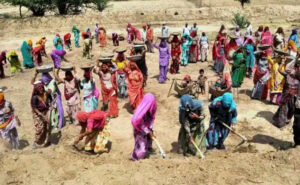GS II- Schemes

Context:
A recent Parliamentary Standing Committee has suggested making the Aadhaar-Based Payment System (ABPS) optional for MGNREGA workers. This comes in response to exclusion errors and delays in wage payments caused by Aadhaar-related discrepancies.
Key Findings of the House Panel:
Challenges with ABPS:
- Many eligible workers faced exclusion due to mismatches between Aadhaar details and job cards.
Delayed Wage Payments:
- A substantial ₹23,446.27 crore remains unpaid in wages and material costs, amounting to 27.26% of the total budget.
Fund Stagnation:
- Suspension of MGNREGA funds in certain states has led to rural distress, migration, and delays in project execution.
Recommendations by the Committee:
Make ABPS Optional:
- Provide alternative payment mechanisms to ensure timely wage distribution and avoid worker exclusion.
Increase Employment Days:
- Expand work guarantee from 100 to 150 days per year, enhancing livelihood security for rural workers.
Timely Fund Allocation:
- Expedite the clearance of pending liabilities worth ₹23,446.27 crore and release West Bengal’s pending dues (except for disputed allocations).
Revise Wage Determination Methodology:
- Move away from the Consumer Price Index for Agricultural Laborers (CPI-AL) for more equitable wage revisions.
Protect Land Rights:
- Ensure that states do not dilute the Land Acquisition Act, safeguarding landowners’ rights and preventing unfair acquisitions.
Conclusion:
The committee’s recommendations highlight the need for inclusive payment systems, better financial planning, and expanded employment opportunities under MGNREGA. Implementing these suggestions can enhance the program’s efficacy in addressing rural unemployment and economic distress.




